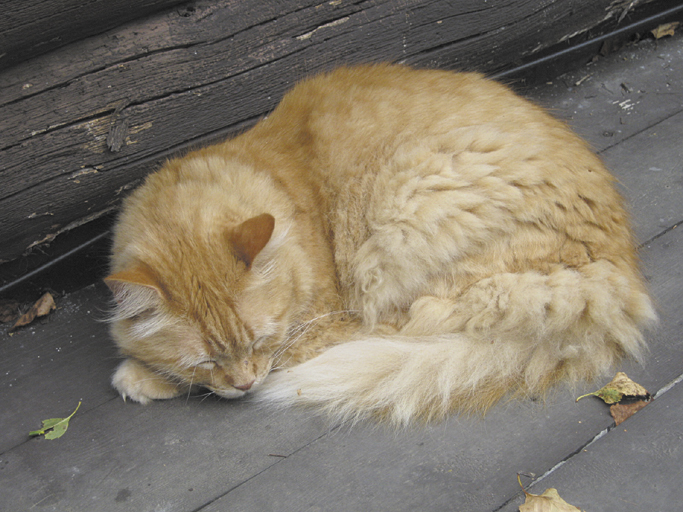It’s a few minutes after noon. Brian is curled up on the bed.
“Brian. You slept on the chair all night,” I say. “Now you’re going to sleep on the bed all day?”
He opens one eye, purrs three or four strokes as if to say, “It’s cool, brother,” and settles back into some parallel cat dimension.
I wonder what he’s doing while he’s asleep. It seems obvious he dreams because he twitches and whimpers. In humans these are signs of a REM state. Whatever it is, Brian spends huge swaths of time there.
Of course, he’s only a cat. (His tufted ears, burly shoulders, thick orange hair and massive, dangerous claws suggest he’s probably got Maine coon cat genes, but no one knows for sure. He might just be huge.)
“Only a cat,” I say, though Brian is an intellectual, if lackadaisical, genius in comparison to his black and white sidekick, Panda, who is the household equivalent of the village idiot.
From one point of view this catthropomorphizing is an amusing but kind of meaningless sort of hyperbole because for a long time, science has denied that animals have anything like rational intelligence. There is just no way to know, empirically, whether animals think. So it has been assumed they act on instinct, and humans are the only people with conscious intelligence.
Of course, anyone who has ever lived with dogs or cats knows how naive this assumption is. Dogs and cats have definite individual personalities, and some are smarter than others.
Poe describes a cat of his that carried out a complicated process of opening a latched door.
And 2,400 years ago Socrates observed that dogs are philosophers. Think about it, he says in The Republic. A dog distinguishes friends or family members from strangers. When a friend approaches, he welcomes him. When a stranger comes in the yard, he gets angry (or, in the case of a trusting dog like a Labrador, he investigates). This means the dog bases his actions on knowledge. Which is what philosophers do. A dog is a philosopher.
So is a cat, though of a more existential ilk. Cats base their actions on a refined knowledge of routines.
Brian scrambles off the chair when he hears the top pop on a can of cat food. He heads for the woods when the younger grandchildren start piling out of cars. He comes out to greet us when he hears our cars, and hides in the garage when unfamiliar vehicles pull in.
Cats’ knowledge of routines can actually be too refined. A veterinarian once told me that in an experiment, some cats were taught (pretty quickly, I imagine) to follow a daily path to a food dish.
When the path was blocked off for a few days, the cats nearly starved because, while they smartly knew the routine, they could not outthink it. Panda could easily starve with food right around the corner. I have a feeling Brian would find the dish because for him, food trumps everything.
To me the phrase “dumb animals” is meaningless. Crows are fully cognizant of where vehicles do and do not drive: They go about their business undisturbed in the breakdown lane, but scatter from the travel lanes. Dragonflies and jumping spiders watch what you’re doing, apparently calculating whether you pose any peril. Cuttlefish, cousins of the octopus, learn to find their way around mazes. Bees, it is reported, can recognize a particular human face in photographs.
Even the scientists have acknowledged that animals are more than electrically animated meat popsicles.
“The Cambridge Declaration on Consciousness,” drawn up by a conference of neuroscientists and neurophysiologists in July 2012, states: “The weight of evidence indicates that humans are not unique in possessing the neurological substrates that generate consciousness. Nonhuman animals, including all mammals and birds, and many other creatures, including octopuses, also possess these neurological substrates.”
Dog and cat owners have known this for a long time, by other means than statistical studies of brain activity.
At night when it’s time to go either downstairs or outside, neither Brian nor Panda wants to go because they both know (see above: Socrates’ dog) that it’s dark downstairs, possibly cold outside, and more comfortable shedding hair on the living room furniture.
Panda, possessing more substrate than neurology, lacks the imagination to make any waves except on impulse, and usually just submits to the routine. Brian has some kind of cat thermostat that knows the outdoor temperature, and volunteers to go out when it’s above 45, but filters toward the basement door when it’s below 45. Filters reluctantly.
He gets this sour look on his face, with sort of squinty eyes and ears twitching back but not flattening like with full-on anger. Just very irritated. Sometimes he pauses in case somebody changes their mind at the last minute.
A few nights ago Bonnie nudged him out of this pause with her foot. He squinted into the distance. But knowing the routine, he stepped down.
“You know he’d give us the finger if he could,” Bonnie said, closing the door. “He wouldn’t turn around. Just up over his shoulder, while he walks away.”
Dana Wilde lives in Troy. His writings on the Maine woods are collected in “The Other End of the Driveway,” available from Booklocker.com and online book sellers. Backyard Naturalist appears the second and fourth Thursdays each month. You can contact him at naturalist@dwildepress.net.
Send questions/comments to the editors.




Success. Please wait for the page to reload. If the page does not reload within 5 seconds, please refresh the page.
Enter your email and password to access comments.
Hi, to comment on stories you must . This profile is in addition to your subscription and website login.
Already have a commenting profile? .
Invalid username/password.
Please check your email to confirm and complete your registration.
Only subscribers are eligible to post comments. Please subscribe or login first for digital access. Here’s why.
Use the form below to reset your password. When you've submitted your account email, we will send an email with a reset code.